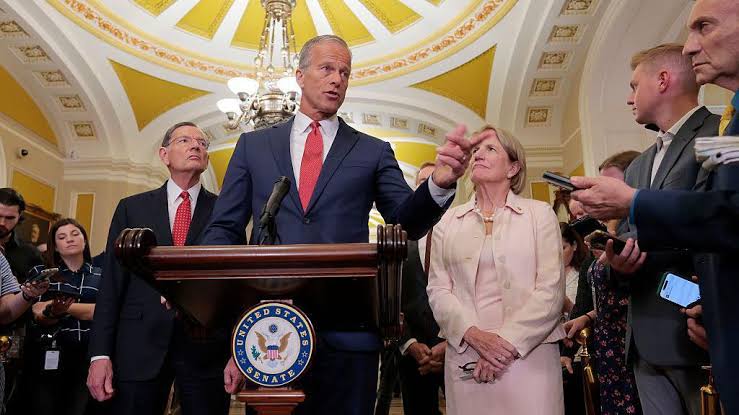
Samuel Omang
The United States Senate has been locked in a marathon overnight voting session over a sweeping and contentious budget proposal known as the One Big Beautiful Bill Act, a nearly 1,000-page document seen as critical to President Donald Trump’s economic and political agenda.
The bill proposes increased spending on border security, defence, and energy production, but offsets those gains with deep cuts to healthcare and food-support programmes—raising serious concerns from both sides of the aisle.
Despite holding the majority in both chambers of Congress, Trump’s Republican Party remains bitterly divided on the bill, particularly over proposed cuts to welfare programmes aimed at funding $3.8 trillion in extended tax breaks.
The legislation is projected to add $3.3 trillion to the US national debt, which currently stands at $36 trillion, according to the Treasury Department. The Congressional Budget Office warns that nearly 12 million Americans could lose health insurance coverage if the bill becomes law.
The Senate has so far spent over 22 hours debating and voting on dozens of amendments in a procedural blitz known as “vote-a-rama.” Vice-President JD Vance was seen arriving at Capitol Hill early Tuesday morning—an indication that Republican leaders may need him to cast a tie-breaking vote if the bill faces defections.
Elon Musk, former head of the Department of Government Efficiency (DOGE), has publicly criticised the bill and the Republican leadership for what he calls “the biggest debt increase in history.” Once an ally of Trump, Musk has now distanced himself from the former president, even threatening to form a new political party if the bill passes.
In a biting response, Trump questioned Musk’s financial dependence on federal subsidies:
“Elon may get more subsidies than any human being in history… Without subsidies, Elon would probably have to close up shop and head back home to South Africa,” Trump said on Truth Social.
Tensions have also surfaced within the Republican caucus. Senator Thom Tillis of North Carolina voted against the bill’s debate, announced his retirement, and slammed colleagues for betraying voters.
“Too many elected officials are motivated by pure raw politics who really don’t give a damn about the people they promised to represent,” Tillis declared.
Other Republican senators, including Rand Paul, have rejected the bill due to the scale of borrowing and proposed Medicaid cuts. An amendment by Senator John Cornyn to reduce Medicaid funding for states covering undocumented immigrants accused of specific crimes was also struck down.
Democrats, meanwhile, have criticised the bill’s impact on rural hospitals and food assistance, and have used procedural tactics to slow its passage.
If the Senate approves the bill, it will return to the House of Representatives for a final vote—expected as early as Wednesday. However, hardline Republicans in the House Freedom Caucus have vowed to oppose it, claiming it adds over $650 billion to the national deficit.
Despite the growing opposition, the White House remains optimistic. Trump spokesperson Karoline Leavitt stated the president is “confident” the bill will reach his desk before Independence Day on July 4.
As Capitol Hill braces for a final showdown, the fate of one of the most divisive and costly legislative efforts in recent US history still hangs in the balance.


